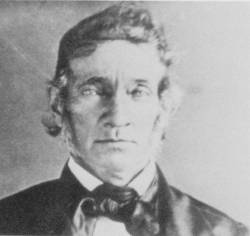|

Maj. Isaiah Stillman |
Voices from Stillman's Run:Major Isaiah Stillman's Account |
TO THE EDITORS OF THE MISSOURI REPUBLICAN.
Gentlemen.---I have his day discovered in your paper of the 22d ult. an account of an engagement between the men under my command and the hostile Sac, and other Indians, on Rock River. Finding the statement altogether incorrect, I take the liberty to give the outlines of the transaction, which I am compelled to do in the utmost haste. On the 12th I received orders from his Excellency John Reynolds, Commander in Chief, &c. to march immediately from Dixon's Ferry, on Rock River, to what is commonly called Old Man's Creek, about thirty miles distance, and coerce such hostile Indians into subjection.---We took up our march on the 13th, and on the 14th, at 2 o'clock, one of our spies discovered two Indians on our left. The Indians immediately fired on him, and undertook to make their escape by swimming Rock River; this, however, they did not succeed in; our spy brought his gun to bear on the forward one, who was tumbled into the river--the horse immediately turned his course, and swam back;--the surviving Indian being, from the unmanageable disposition of his horse, compelled to follow, until he shared the fate of his complication. Both horses were brought in. We reached our camping ground on the north side of Old Man's Creek, about 6 o'clock, after having used every precaution to guard against being deceived by the Indians--having kept out the most experienced spies and a very strong guard, front, rear and flank during the day. Soon after our arrival, we discovered a small party of men in our advance, supposed at that time to be a part of our front guard. Lt. Gridley, being then mounted, passed up a ravine, for the purpose of ascertaining. It was soon after, however, ascertained that our spies, with the whole of our advance guard, had come in. Capt. Covall, with a party detached, followed. On the approach of Lt. Gridley, while rising the bluff, the Indians faced, and levelled their guns; when prudence directed a return. The Indians pursued, and were met by Capt. Covall, nearly at the same moment, when a fire was exchanged without effect. The Indians retreated, and were pursued. Three were killed and three taken, with the loss of one of our men, (as supposed.) Our men were all immediately formed, and took their march in the direction of Sycamore Creek, about five miles above. After marching about three miles, an Indian appeared, and made signs of peace. I was informed of the fact, and orders were given for a halt. Myself, together with most of the field and staff officers, advanced, with Capt. Eads as an interpreter. We were soon informed that the Indians would surrender, in case they could be treated as prisoners of war; this was promised them, and they returned with the intelligence, after promising to meet us at a specified point. On arriving at that point, however, no Indians appeared to make their proposed treaty, which convinced us of treachery. Directions were immediately given for our men to advance, while Capt. Eads proceeded a few yards alone to make further discovery. On reaching Sycamore Bluff, the Indians were discovered in martial order; their line extended a distance of near two miles, and under rapid march. Their signals were given for battle--the war-whoop was heard in almost every direction--their flanks extending from one creek to the other. Orders were given for a line of battle to be formed on the south side of a marsh between the two creeks, while the Indians were advancing with the utmost rapidity--their fire was tremendous; but on account of the distance, of little effect. Night was closing upon us in the heart of an Indian country, and the only thing to brighten our prospects, the light of our guns. Both officers and men conducted with prudence and deliberation, until compelled to give ground to a superior foe, when orders for a retrograde maneuvre was given, and our men again formed on Old man's Creek. Here a desperate attempt was made by the Indians to out flank us, and cut off our retreat, which proved ineffectual—some clubing their firelocks, others using their tomahawks and spears. A party of our men crossed the creek, and with much difficulty silenced their fire, which made way for the retreat of our whole party, which was commenced and kept up, with few exceptions, in good order. Both officers and men conducted with firmness and prudence. Many of our officers and men, having been at the battle of Tipacanoe, Bridgwater, Chippewa, and Fort Erie, have never faced a more desperate enemy. Having had the advantages of ground, the enemy being on an eminence, operated much in our favor. In passing Old Man's Creek, many of them got their guns wet, and were deprived of the use of them. Our force consisted of two hundred and six men; that of the Indians, not known, but consisted of the whole hostile band. Eleven of our men were killed, five wounded, with the loss of thirty-four of the enemy. From report, their encampment consisted of 160 lodges. Our men mostly arrived at Dixon's Ferry about 3 o'clock, A.M. and it is to be hoped, that in a short time the number of troops stationed at that point, and elsewhere, will be able to bring them into subjection, and relieve our frontier from our much dreaded foe. I am, with much respect, your obedient servant,
J. STILLMAN. Brig. Gen. 5th Brig. 1st Div. Ill Mi.
In Camp, 19th June, 1832, |
Source: St. Louis Missouri Republican.
(7/10/1832)
| |
Department
of Anthropology |
copyright © 2002
University of Illinois, All rights reserved. |

